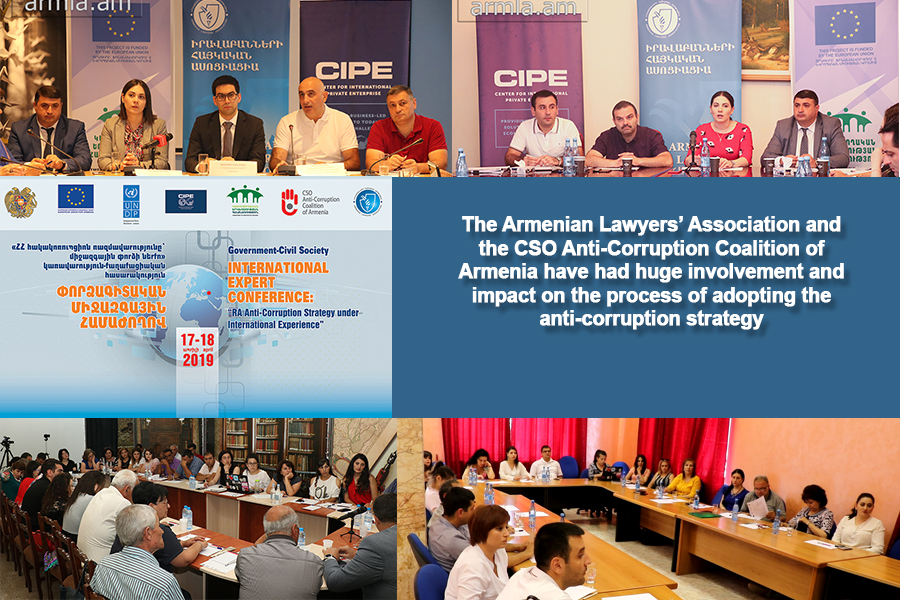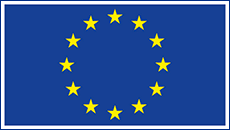
On 3 October 2019, the Government of the Republic of Armenia approved the “Anti-Corruption Strategy of the Republic of Armenia and its Implementation Action Plan for 2019-2022” presented by the Ministry of Justice of the Republic of Armenia (hereinafter: the Strategy), that is another successful example of state-civil society partnership and constructive dialogue.
Below is shortly represented the main stages of this process:
- On 11 June 2018, the CSO Anti-Corruption Coalition of Armenia (hereinafter: the Coalition) and the Armenian Lawyers’ Association (hereinafter: the ALA) represented the document to the Ministry of Justice of RA, named “ “Conceptual provisions” on the Anti-Corruption Strategy of RA, 2019-2022” by proposing to include 49 recommendations in the new anti-corruption strategy being drafted by Ministry of Justice (more info at: https://armla.am/en/3392.html).
- On 19 December 2018, within the framework of the EU funded “Commitment to Constructive Dialogue” project (hereinafter: CCD) the public discussion on the draft Strategy was organized in cooperation with the Ministry of Justice with participation of the Coalition’s representatives, as well as other civil society organizations’ representatives (more info at: https://armla.am/en/3314.html). On the same day the Ministry of Justice published a draft Strategy on the unified website for publication of legal acts’ draft versions; e-draft.am. Under the Coalition’s suggestion the deadline for submitting recommendations on the draft Strategy was extended until January 31 2019. At that stage 22 out of 49 recommendations submitted by the Coalition and the ALA had not been accepted.
- On 31 January 2019, the Coalition’s Secretariat-the ALA published opinions and recommendations on the draft Strategy on the e-draft.am website, as well as the ALA sent a copy to the Ministry of Justice (more info at: https://armla.am/en/3653.html). It should be stated that at that stage only 5 of the 61 submitted recommendations were rejected.
- On 14 February 2019, the Coalition and the ALA made a brief summary on the introduction of the anti-corruption institutional system by proposing to establish an independent universal anti-corruption body (more info at: https://armla.am/en/3818.html ).
Afterwards, on 12 August 2019, the Coalition and the ALA reviewed the above-mentioned brief summary and published the new version of its (more info at: https://armla.am/en/5048.html). - On April 17 and 18 2019, the Government-Civil Society International Expert Conference: “RA Anti-Corruption Strategy under International Experience” was held in Yerevan organized jointly by the ALA, the Coalition and the Ministry of Justice within the framework of the EU-funded “CCD” project and in collaboration with United Nations Development Programme (UNDP) and the Centre for International Private Enterprises (CIPE) (more info at: https://armla.am/en/3984.html). Summary of the conference can be found at https://armla.am/en/4307.html.
- Within the framework of the EU funded “CCD” project and “Armenia: Promoting Anti-Corruption Conduct and Reforms” project implemented by the “Center for International Private Enterprise” (CIPE) on July 2019, a series of public discussions on the revised draft Strategy were organized by the ALA and the Coalition in Shirak, Lori and Gegharkunik regions (more info at: https://armla.am/en/4588.html, https://armla.am/en/4725.html, https://armla.am/en/4704.html ). And on August 1 2019, a public final discussion of the revised draft Strategy was held in Yerevan (more info at https://armla.am/en/4734.html).
- On 12 August 2019, the Coalition and the ALA presented an Opinion-Stance and Recommendations on the revised draft Strategy (more info at: https://armla.am/en/4756.html). At that stage, only 4 out of the 23 submitted recommendations were rejected.
Hence, within the framework of the EU-funded “CCD” project during the whole period of the Strategy drafting number of 133 recommendations were submitted by the Coalition and the ALA, from which 101 were accepted fully, partially, or taken into consideration and only 31 were rejected. This confirms that this is a successful example of a CSO-Government constructive dialogue.


